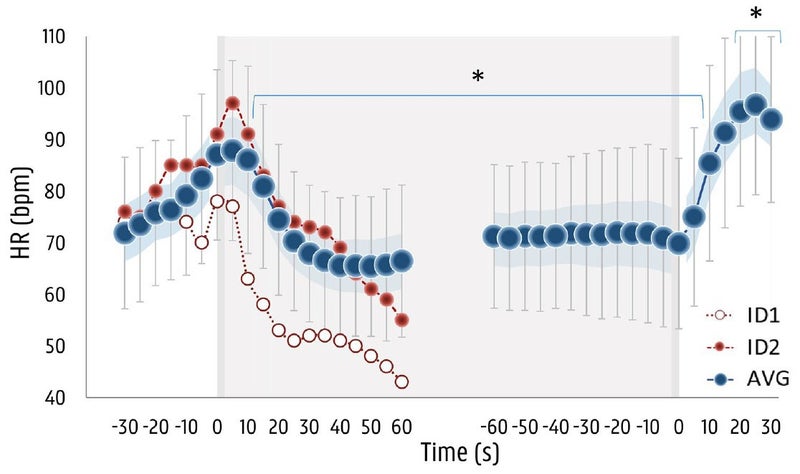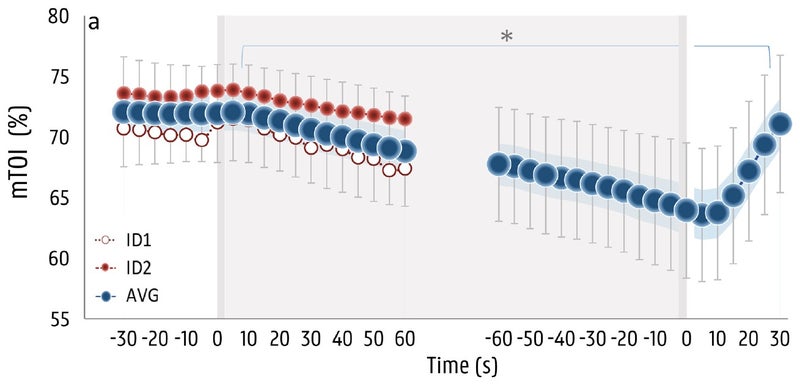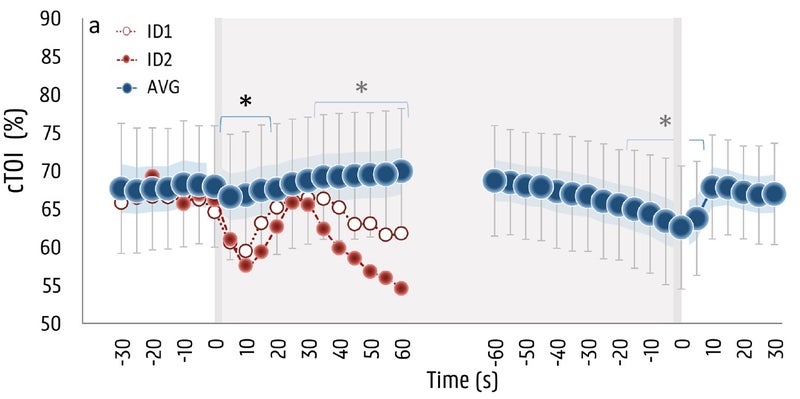When You Hold Your Breath
Get full access to Outside Learn, our online educational activity hub featuring in-depth fitness, nutrition, and take chances courses and more than than 2,000 instructional videos when you sign upward for Outside+.
We all know what it feels like to run out of oxygen—or at least, what it feels like to feel like we're running out of oxygen. In reality, the breathlessness we experience during difficult exercise, or at high altitude, or when merely belongings our breath, has more to do with too much carbon dioxide in the claret than with too little oxygen. As the feats of elite freedivers show—like holding a single breath for 11 minutes and 35 seconds—our limits aren't what they seem.
I've long been fascinated by studies of what'due south going on inside freedivers when they hold their breath, what defines their limits, and how those skills may translate to other environments like high altitude. But their abilities are and then outlandish that it feels like studying another species. And so I was specially interested to encounter a recent study in the European Periodical of Applied Physiology that looked at jiff holding in regular people with no prior training in it. The study is very straightforward, taking measurements of heart rate and oxygen levels while volunteers hold their breath, and it offers a revealing picture of how the torso copes with a shortage of oxygen—and what can go incorrect.
The research was performed at Ghent University in Belgium, past Janne Bouten, Jan Bourgois, and January Boone. (I'm bold scientists in Kingdom of belgium are assigned to different departments by alphabetical order.) They asked 31 volunteers (17 men, 14, women) to hold their breath for as long every bit possible three times in a row, with two minutes break each time. Typically people get improve and better in repeated breath holds, in part because their spleens are squeezing more than oxygen-carrying red blood cells into apportionment. During the tertiary and final breath concur, they took continuous measurements of parameters including heart rate, oxygen levels in the brain, and oxygen levels in the leg muscles.
Humans, similar other mammals, have a "diving response" that kicks in when you agree your jiff, with the goal of making sure your brain always has plenty oxygen. Equally the researchers bespeak out, if your circulation stops abruptly, you'll be unconscious within thirty seconds and suffer irreversible harm within ii to ten minutes. The diving response is enhanced if your face is submerged in water, but information technology happens even on dry out land. Your heart rate drops, and the claret vessels leading to not-essential parts of the body like your leg muscles constrict in order to redirect crucial blood (and oxygen) to the brain.
The subjects held their third jiff for an average of ii minutes and 37 seconds, which strikes me as incredibly skillful for normal untrained people. Perchance doing iii breaths in a row is the clandestine; or peradventure I'm just weak. Anyway, here's what the average heart rate response looked like. The data is only shown for the showtime 60 seconds (on the left) and the concluding threescore seconds (on the right), which allows them to plot everyone'due south information together even though they lasted differing amounts of time. The gray expanse indicates when they started and stopped the breath hold.

On the far left, y'all can see the blue dots (which represent the average value) increasing as the subjects ready for the breath hold. This may be because they're getting excited or apprehensive, and may likewise be the result of taking some deep breaths in training. The subjects were specifically forbidden from hyperventilating before the breath agree (which blows off a bunch of carbon dioxide, assuasive you to agree your jiff for longer), but they were given a 30-second warning and a 10-2nd inaugural, and told to take a deep merely not maximal breath correct before starting. Inside almost ten seconds after starting the breath concur, heart charge per unit is dropping. Information technology ends upwardly decreasing by 27 beats per minute, reaching its low signal after 83 seconds on average. This is fairly similar to what you meet in elite free divers, except they reach their minimum heart charge per unit within thirty to threescore seconds.
Y'all'll notice a serial of red dots, and another series of white dots. There are 2 individuals who quit early; one of them fainted, and the other got airheaded and was on the verge of fainting. More on them below.
The next parameter is tissue oxygenation in the leg muscles, as measured with near-infrared spectroscopy, which basically involves shining infrared light through the peel and measuring how much is absorbed past oxygen-rich hemoglobin. Here the picture is pretty straightforward: oxygen levels in the muscles start dropping within five seconds, and continue dropping until the subjects start breathing once again. This is what you'd wait, because the blood vessels are constricting to shift blood menstruation away from the extremities to the brain.

The concluding piece of the puzzle is where things become interesting. Brain oxygenation was also measured with near-infrared spectroscopy:

Here y'all see an initial decrease in brain oxygen levels, perhaps related to the sudden driblet in claret pressure associated with the starting time of a breath hold. But inside about five seconds, the drop reverses and brain oxygen levels start to climb—and in fact go on to accomplish levels most four percent college than baseline later on about a minute. This is a pretty good indication of how powerful the encephalon's self-protective wiring is: you hold your jiff, and information technology gets more oxygen rather than less.
That happy country of affairs doesn't last forever, though. Even equally more and more blood gets shunted to the brain, that blood is carrying less and less oxygen as the jiff agree proceeds, so gradually your levels of encephalon oxygen brainstorm to decline. That decline continues until, eventually, you surrender. On average, brain oxygen dropped by about v per centum by the time the subjects gave up. Interestingly, that's about the aforementioned level you lot see in elite freedivers later 2 and a half minutes. That means the freedivers aren't significantly better at maintaining their brain'southward oxygen levels. Instead, the difference seems to exist that they're willing to keep enduring the unpleasant urge to breathe for longer. Other research has found that freedivers are capable of holding their jiff until their encephalon oxygen levels drop so low that they lose consciousness—a very dangerous situation if it happens underwater.
Which brings us back to the two subjects who fainted or came close to information technology. If y'all look again at the graph of encephalon oxygen levels, y'all tin can run into that their data is fashion out of whack compared to everyone else's. They have a steep drop, and then manage to compensate for a trivial while, but the driblet resumes and very presently their brain oxygen levels are so low that they reach the border of consciousness. For the red dots, the musculus oxygen data suggests that this subject had a weak response in constricting claret flow to the muscles. That ways he or she kept pumping blood to the extremities and didn't get plenty to the brain. For the white dots, the data doesn't requite whatever hints most what went incorrect, simply the result was the aforementioned: non enough oxygen to the encephalon.
Ane of the rationales for the written report was that some researchers and coaches have advocated diverse forms of jiff-agree preparation to better athletic or altitude functioning. Since virtually previous breath-concur inquiry used trained freedivers, information technology wasn't clear whether the brain's self-protection mechanisms would kick in for novices. The new data indicates that information technology's okay, but the two fainters besides show that caution is needed: the researchers propose that anybody should be familiar with the warning signs of fainting (most notably dizziness), and not perform breath-agree grooming alone.
For more than Sweat Science, join me on Twitter and Facebook , sign up for the email newsletter, and check out my book Endure: Heed, Trunk, and the Curiously Elastic Limits of Human Functioning.
Source: https://www.outsideonline.com/health/training-performance/breath-holding-research-2020/
0 Response to "When You Hold Your Breath"
Post a Comment